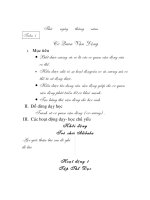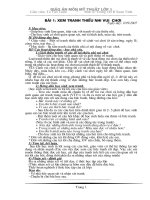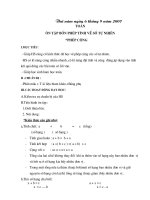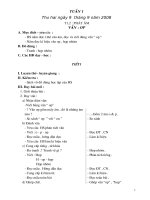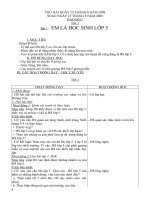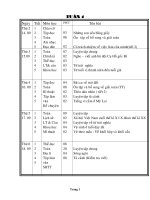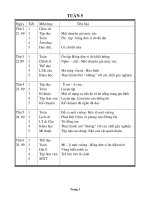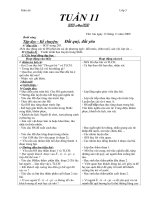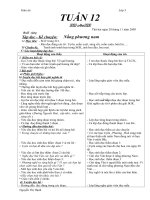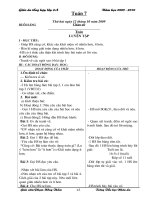Giao an tong hop
Bạn đang xem bản rút gọn của tài liệu. Xem và tải ngay bản đầy đủ của tài liệu tại đây (401.87 KB, 69 trang )
GIÁO ÁN TỰ CHỌN TIẾNG ANH 12 SÁCH THÍ ĐIỂM
Period: 1st
EXERCISES ON VOCABULARY IN UNIT 1. LIFE STORIES
I. Objectives: By the end of the lesson, students will be able to:
o Review and do exercises on vocabulary, stress and pronunciation in unit
1.
o Get some tactics in doing exercises (word form, word choice, .... )
o Develop skills in doing English tests.
II. HANDOUTS
1. achievement /əˈtʃiːvmənt/(n): thành tích, thành tựu
2. anonymous /əˈnɒnɪməs/(a): ẩn danh, giấu tên
3. dedication /ˌdedɪˈkeɪʃn/(n): sự cống hiến, hiến dâng, tận tụy
4. diagnose /ˈdaɪəɡnəʊz/(v): chẩn đoán (bệnh)
5. distinguished /dɪˈstɪŋɡwɪʃt/ (a): kiệt xuất, lỗi lạc
6. figure/ˈfɪɡə(r)/ (n): nhân vật
7. generosity /ˌdʒenəˈrɒsəti/(n): sự rộng lượng, tính hào phóng
8. hospitalisation /ˌhɒspɪtəlaɪˈzeɪʃn/(n): sự nhập viện, đưa vào bệnh viện
9. perseverance /ˌpɜːsɪˈvɪərəns/(n): tính kiên trì, sự bền chí
10. prosthetic leg /prɒsˈθetɪk leɡ/(n.phr): chân giả
11. reputation/ˌrepjuˈteɪʃn/ (n): danh tiếng
12. respectable/rɪˈspektəbl/(a): đáng kính, đứng đắn
13. talented/ˈtỉləntɪd/ (a): có tài năng, có năng khiếu
14. waver /ˈweɪvə(r)/ (v): dao động, phân vân
A. PRONUNCIATION
1. a. diagnose
b. achievement
c. talented
d.
anonymous
2. a. prosthetic
b. reputation
c. dedication
d.
respectable
3. a. distinguished
b. result
c. generosity
d.
respectable
4. a. waver
b. reputation
c. creativity
d. character
5. a. perseverance
b. generosity
c. talented
d.
judgement
6. a. congestion
b. ambition
c. influential
d.
reputation
B. STRESS
7. a. perseverance
b. experience
c. dedication
d.
influential
8. a. generosity
b. hospitality
c. encyclopedia
d. creativity
9. a. celebrity
b. charitable
c. anonymous
d.
respectable
10. a. overcome
b. incident
c. dedicate
d. currently
C. VOCABULARY AND GRAMMAR
11. Before passing away, President Ho Chi Minh left the Vietnamese people with the
___ Testament (chúc thư).
a. important
b. essential
c. historic
d. historical
12. Her ___ to medicine was so great that she had little time for anything else.
a. importance
b. dedication
c. emphasis
d.
reputation
13. Tran Hung Dao was a great ___ to lure the enemy to enter deeply into his land,
then attacked to destroy them.
a. strategy
b. strategist
c. soldier
d. king
14. In spite of having a peasant ___, Nguyen Hue had proved that he was really an
excellent general, only gained victories.
a. situation
b. experience
c. condition
d.
background
15. In 1921, Phan Boi Chau studied socialism and the Soviet Union in ___ assistance
from the Soviet Union or socialist groups.
a. hope to gain
b. hope of gaining
c. the hope of gaining d. the hope
to gain
16. Bill Gate’s ___ in donating large sums of money towards welfare activities is
remarkable.
a. generosity
b. politeness
c. wealth
d. talent
17. Nguyen Hue invited ___ scholars at that time: Nguyen Thiep, Tran Van Ky, and
Ngo Thoi Nham.
a. ɸ
b. that
c. some
d. the
18. At first, Microsoft had ___ hyphen in the name “Micro-soft”, combination of
microcomputer and ___ software.
a. a-the-a
b. a-a- ɸ
c. the-the- ɸ
d. ɸ-a-the
19. Dr. Jane Luu ___ the huge telescope at the University of Hawaii while she ___ for
any bodies beyond Neptune.
a. was using-searched b. used-had searched
c. used-was searching d. had
used-searched
20. I first met her four years ago when we ___ at a middle school.
a. had been studying b. are studying
c. have been studying d. were
studying
21. This school has an excellent ___ in the community.
a. image
b. reputation
c. name
d. opinion
22. He seems like a ___ businessman, but he has caused some personal scandals.
a. respecting
b. respectful
c. respectably
d.
respectable
23. Le Loi used the ___ war, moving from little to large scale.
a. mid-term
b. short-term
c. long-term
d. half-term
24. Nguyen Hue, with his genius ___, created a people’s army, no matter small or
large.
a. leading
b. leader
c. lead
d.
leadership
25. Being stormy and sudden were the special characteristics in the battle ___ of
Nguyen Hue.
a. method
b. approach
c. strategy
d. acsess
26. When his mother showed him a newspaper article about a man dealing with a
severe disability, Vujicic realized he wasn’t ___ in his struggles.
a. unique
b. lonely
c. alone
d. only
27. As well as being a successful actor, Clint Eastwood is a ___ film director.
a. talent
b. talented
c. distinguish
d.
respectful
28. ___ Emperor Quang Trung was ___ second emperor of ___ Tay Son Dynasty,
reigning from 1788 to 1792.
a. The-a-the
b. ɸ-a-the
c. ɸ-the-the
d. ɸ-the- ɸ
29. Bill Gates was ___ middle child of William H. Gates II, ___ prominent Seattle
lawyer, and Mary Gates, who worked as ___ teacher before she had children.
a. the-a-a
b. a-a-a
c. the-the-a
d.
the-the-the
30. When Jane Luu ___ as a graduate student at MIT, David Jewitt ___ there as a
professor.
a. enrolled - was working
b. had enrolled – was working
c. was enrolling – had worked
d. enrolled – has worked
D. WRITING:
1. Put the verbs in brackets in the past simple or the past continuous.
31. I (wait) _________ for a taxi when I saw my friend.
32. It (rain) _________ when I left the house.
33. Last night I (lie) _________ in bed when I (hear) _________ a strange noise.
34. When we (arrive) _________ home from Nha Trang, we (still wear) _________ Tshirts and shorts.
35. I (look) _________ at some old photos when I (find) _________ one of my dad’s
photos when he was seventeen. He (have) _________ really long hair.
Keys: 31. Was waiting
32. Was raining
33. Was lying-heard
34. arrived – were still wearing
35. Was looking – found – had
2. Use the words or phrases given to write the meaningful sentences.
36. Le Thanh Tong/ king/ whose name/ contributions/ closely linked/ Vietnam’s
prosperous stage/ late 15th century.
_____________________________________________________________________
_________
37. During his 38 years/ ruling/ King Le Thanh Tong/ carry out/ reforms/ politics/
military/ economy
_____________________________________________________________________
_________
38. He/ initiate/ Hong Duc Code/ which/ mark/ high level/ civilization/ Vietnam/ and/
promote/ national cultural values.
_____________________________________________________________________
_________
39. He himself/ great poet/ number/ value poems.
_____________________________________________________________________
_________
40. Valuable documents/ submitted/ UNESCO/ recognition/ King Le Thanh Tong/ a
World Cultural Celebrity.
_____________________________________________________________________
_________
41. Nguyen Du/ pen-name/ To Nhu and Thanh Hien/ born/ 1765/ Thang Long.
_____________________________________________________________________
_________
42. Nguyen Du/ witness/ many changes/ transition/ the Le/ Nguyen Dynasties/ and/ his
works/ reflect/ Vietnam’s society during these years.
_____________________________________________________________________
_________
43. Nguyen Du’s poems/ display/ spiritual life/ Vietnamese people.
_____________________________________________________________________
_________
44. His life/ career/ works/ especially The Tale of Kieu/ interest readers/ all walks/
life/ Vietnam/ and scholars abroad.
_____________________________________________________________________
_________
45. Nguyen Du/ recognized/ World Cultural Celebrity/ UNESCO/ 2013.
_____________________________________________________________________
_________
Keys:
36. Le Thanh Tong is the king whose name and contributions closely linked to
Vietnam’s prosperous stage in the late 15th century.
37. During his 38 years of ruling, King Le Thanh Tong carried out reforms in politics,
military, and economy.
38. He initiated the Hong Duc Code which marked a high level of civilization of
Vietnam, and promoted national cultural values.
39. He himself was a great poet with a number of valuable poems.
40.Valuable documents were submitted to UNESCO for the recognition of King Le
Thanh Tong as a World Cultural Celebrity.
41. Nguyen Du, whose pen-names are To Nhu and Thanh Hien, was born in 1765 in
Thang Long.
42. Nguyen Du witnessed many changes in the transition form the Le to Nguyen
Dynasties, and his works reflected Vietnam’s society during these years.
43. Nguyen Du’s poems displayed the spiritual life of Vietnamese people.
44. His life, career and works, especially the Tale of Kieu, interest readers of all walks
of life in Vietnam and scholars abroad.
45. Nguyen Du was recognized as a World Cultural Celebrity by UNESCO in 2013.
III. CONSOLIDATION:
o Summarize the main points of the lesson
Period: 2nd
REVIEW OF TENSES
I. Objectives : By the end of the lesson, students will be able to:
o Review the forms and uses of some tenses: Past simple, past progressive,
present perfect, ....
o Practice doing exercises relating to above tenses.
II. TEACHING PROCEDURE
Teacher's activities
Students' activities
I. Review of tenses:
- Teacher – students.
1. Past simple:
- Ask Ss to give the forms and uses of past simple
tense.
- Tell the forms and uses of the
a. Form:
tenses.
- S + V2/ V+ ed.
- S + didn't + V-bare infinitive.
- Did/ Didn't + S + V-bare infinitive?
- Give some examples:
b. Use:
+ I saw him last night.
- To talk about an action that happened and ended in
+ She didn’t go to school
the past (sometimes with a definite time).
yesterday.
- To talk about past habit (= used to + V-bare
+ Did Mr. Lee phone me a few
infinitive)
minutes ago?
c. Time expression: ago, yesterday, last night, in 1980,
2. Past progressive:
- Elicit from students the forms and uses
a. Form:
- S + was/ were + V-ing
- S + was/ were + not + V-ing
- Was/ Were + S + V-ing?
b. Use:
- to talk about sth which was in progress at a past time.
- to talk about an action which was in progress when
another action interrupted it.
Ex:
- A: "What were you doing when
I called you last night?"
- B: "I was watching TV".
3. Present perfect:
a. Form:
- S + have/ has + PP
b. Use:
- to talk about sth which started in the past and
continues up to present,
- experience or activities they have ever done up to
present (without a definite time),
- past action whose result is connected to the present.
Ex:
- I have never been to NY.
- We were walking in the park
when it started to rain.
- Have ever eaten Chinese food?
- How long have you been here?
II. Practice:
1. Exercise 1: Put the verb in brackets in the correct tense:
Present simple, Present progressive, Present perfect or
Present perfect progressive.
1. Look! A man ……………….(run) after the train.
2. She ……………….(go) to school everyday.
3. It ……………….(rain) very hard now.
4. He ……………….(not do) morning exercises
regularly.
5. How long (you/ study) ...................... English?
6. They ………………(play) soccer at the moment.
7. I never (see) ...................... this film before.
8. The sun …………(rise) in the East and ……… (set)
in the West.
9. Listen! Someone ……………… (cry).
10. My father (work) .................. for this company for
20 years now.
11. We ……………………(be) student in class 12A
12. (You /be) ..................... to the USA?
2. Exercise 2: Put the verb in brackets in the correct tense:
Past simple, Past progressive, Past perfect.
1. They ………………(go) out a few minutes ago.
2. What (you/ do) .......................... at this time yesterday?
3. By the time we arrived at the cinema, the film (start) ........
4. ……… you and Tom …… (enjoy) the party last night?
5. When we were on holiday, the weather …… (be) terrible.
6. When I found my wallet, someone (take) ................. the
money.
7. I ..................... (walk) in the park when it started to rain.
8. Last night, when I (come) ..................... to the party,
Mary already (go) ................... home.
9. We were having dinner when they (arrive) ..................
10. I (go) ....................... to Paris last year.
3. Exercise 3: Rewrite the sentences, using the words given.
1. The last time I saw him was in 2003.
--> I have not ..............................................
2. I have never seen this film before.
--> This the first .........................................
3. I started learning English 6 years ago.
--> I have .....................................................
4. It last rained 6 months ago.
--> It has not ...............................................
III. CONSOLIDATION:
o Summarize the main points of the lesson
- Answer key:
1. Exercise 1:
1. is running
2. goes
3. is raining
4. doesn't do
5. have you studied/ have you
been studying
6. are playing
7. have never seen
8. rises/ sets
9. is crying
10. has been working/ has worked
11. are
12. Have you been
2. Exercise 2:
1. went
2. were you doing
3. had started
4. Did .......... enjoy
5. was
6. had taken
7. was walking
8. came/ had already gone
9. arrived
10. went
3. Exercise 3:
1. I have not seen him since 2003
2. This is the first time I have
seen this film.
3. I have been learning E for 6
years.
4. I has not rain for 6 months.
Period: 3rd
EXERCISES ON VOCABULARY IN UNIT 2
I. Objectives : By the end of the lesson, students will be able to:
o Review and do exercises on vocabulary, stress and pronunciation in unit
2.
o Get some tactics in doing exercises (word form, word choice, .... )
o Develop skills in doing English tests.
II. TEACHING PROCEDURE
1. agricultural /ˌỉɡrɪˈkʌltʃərəl/(a): thuộc về nơng nghiệp
2. centralise /ˈsentrəlaɪz/(v): tập trung
3. cost – effective /ˌkɒst ɪˈfektɪv/(a): hiệu quả, xứng đáng với chi phí
4. counter – urbanisation /ˌkaʊntə ˌɜːbənaɪˈzeɪʃn/(n): phản đơ thị hóa, dãn dân
5. densely populated /ˈdensli ˈpɒpjuleɪtɪd/: dân cư đông đúc/ mật độ dân số
cao
6. discrimination /dɪˌskrɪmɪˈneɪʃn/(n): sự phân biệt đối xử
7. double /ˈdʌbl/(v): tăng gấp đôi
8. downmarket /ˌdaʊnˈmɑːkɪt/(a): giá rẻ, bình dân
9. down-to-earth /ˌdaʊn tu ˈɜːθ/(a): thực tế/ sát thực tế
10. energy-saving /ˈenədʒi ˈseɪvɪŋ/(a): tiết kiệm năng lượng
11. expand /ɪkˈspỉnd/ (v): mở rộng
12. industrialisation /ɪnˌdʌstriəlaɪˈzeɪʃn/(n): sự cơng nghiệp hóa
13. interest-free /ˌɪntrəst ˈfriː/ (a): khơng tính lãi/ khơng lãi suất
14. kind-hearted /ˌkaɪnd ˈhɑːtɪd/ (a): tử tế, tốt bụng
15. long-lasting /ˌlɒŋ ˈlɑːstɪŋ/(a): kéo dài, diễn ra trong thời gian dài
16. migrate /maɪˈɡreɪt/(v): di cư
17. mindset /ˈmaɪndset/ (n): định kiến
18. overload /ˌəʊvəˈləʊd/ (v): làm cho quá tải
19. sanitation /ˌsænɪˈteɪʃn/(n): vệ sinh
20. self-motivated /ˌself ˈməʊtɪveɪtɪd/ (a): tự tạo động lực cho bản thân
21. slum /slʌm/(n): nhà ổ chuột
22. switch off /swɪtʃ ɒf/ (v): ngừng, thôi không chú ý đến nữa
23. time-consuming /ˈtaɪm kənsjuːmɪŋ/(a): tốn thời gian
24. thought-provoking /ˈθɔːt prəvəʊkɪŋ/ (a): đáng để suy nghĩ
25. unemployment /ˌʌnɪmˈplɔɪmənt/(n): tình trạng thất nghiệp
26. upmarket /ˌʌpˈmɑːkɪt/ (a): đắt tiền, xa xỉ
27. urbanisation /ˌɜːbənaɪˈzeɪʃn/(n): đơ thị hóa
28. weather-beaten /ˈweðə biːtn/ (a): dãi dầu sương gió
29. well-established /ˌwel ɪˈstỉblɪʃt/ (a): được hình thành từ lâu, có tiếng tăm
30. worldwide /ˈwɜːldwaɪd/ (adv): trên phạm vi toàn cầu
A. PRONUNCIATION
1. a. expand
b. centralize
c. densely
d. energy
2. a. migrate
b. scale
c. lasting
d. populated
3. a. fluctuate
b. sanitation
c. established
d. steadily
4. a. slum
b. industrialization c. rural
d. fluctuate
5. a. provoking
b. overload
c. propose
d. progressive
6. a. housing
b. established
c. centralise
d. urbanisation
B. STRESS
7. a. expand
b. migrate
c. effect
d. double
8. a. initiative
b. necessary
c. discriminate
d. authority
9. a. progressive
b. congestion
c. urbanized
d. creation
10. a. populated
b. industrialized
c. environment
d.
inhabitant
C. VOCABULARY AND GRAMMAR
11. ___ is what shaped our cities into what they are today.
a. Electrification
b. Industrialisation
c. Determination
d. Urbanisation
12. The lack of running water, ___ and inadequate housing leads to deadly conditions
in the slums in many cities in Africa.
a. sanitation
b. irrigation
c. urbanization
d. industrialization
13. ___ are urban areas that are heavily populated with substandard housing and very
poor living conditions.
a. Huts
b. Tents
c. Slums
d. Cottages
14. If you don’t ___ this opportunity, you might not get another one.
a. catch
b. grab
c. capture
d. hold
15. You may find you’ve got so many things to think about that it’s difficult to ___.
a. see off
b. put off
c. turn it off
d. switch off
16. I can’t stand ___people who are not tolerant of new ideas.
A. narrow-mind
b. narrow-minded
c. minded-narrow
d. narrow-minding
17. He asked reporters to provide him with ___ numbers on urban percentages.
a. dated
b. up-to-minute
c. out-of-date
d. up-to-date
18. Her doctor suggested that she ___ a short trip abroad.
a. will take
b. would take
c. take
d. took
19. It is desirable that the plane ___ as light as possible.
a. be
b. is
c. was
d. were
20. It is recommended that he ___ his course.
a. taking
b. take
c. takes
d. took
21. What are the socio-economic impacts of relocation as the result of the process of
urbanization and ___ on individuals and their livelihoods in Vietnam?
a. centralization
b. industrialization
c. restoration
d. sanitation
22. ___ and poverty force people to engage in anti-social activities.
a. Employees
b. Employment
c. Unemployment
d. Jobs
23. The first wave of urban ___ took place in more developed countries, espacially in
Europe and North America.
a. migration
b. immigration
c. emigration
d. evacuation
24. The necessary infrustructure often cannot ___ fast enough to keep up with
resident’s needs.
a. exceed
b. excel
c. expand
d. expect
25. Traffic congestion has become a mojor issue, while schools and hospital are ___.
a. overbearing
b. overdone
c. overdeveloped
d. overloaded
26. His face was lined and ___.
a. weathered
b. weatherproof
c. weather-beaten
d. weather-beating
27. The government said that they didn’t have enough funds to deal with ___ medical
care.
a. low-cost
b. high-cost
c. cost-high
d. high-effective
28. His father left New York. The doctor suggested he ___ there.
a. not stayed
b. won’t stay
c. not stay
d. not go to stay
29. It is imparative that this letter ___ immediately.
a. were sent
b. sent
c. was sent
d. be sent
30. The chairman requested that ___.
a. the members study the problem carefully b. with more carefulness the problem
could be studied
c. the problem was more carefully studied d. the members studied more carefully the
problem
D. WRITING:
I. Complete the sentences, using the correct form of the verbs in brackets.
Some of the verbs are passive.
31. It is essential that utilities such as running water and electricity (supply)
________ to those urban areas.
32. It is desirable that every young man over 22 (have) _______ a job.
33. Local residents requested that suitable measures (take) _______ to deal with
the problem of pollution.
34. It is vital that urban areas (set) _____ near natural resources.
35. Local residents suggested that more universities (establish) _________ to
train and develop human resources.
key: 31. be supplied
32. have
33. be taken
34. be set
35. be established
II. Complete each gap in the sentences with one suitable compound
adjective.
36. This is an entertaining yet _____ film.
37. While baseball and football are seasonal in Europe, bowling is a ____ sport.
38. Learning a language seems to be a ______ process.
39. If your face or skin is _____, it is rough with deep lines because you have
spent a lot of time outside in bad weather.
40. The juicy grapes left a ____ taste in my mouth.
Key: 36. thought-provoking
37. year-round
38. neverending
39. weather-beaten
40. long-lasting
III. Use the words or phrases given to write meaningful sentences about
population growth and urbanisation in the world.
41. Continuing population growth/ urbanisation/ expected/ add 2.5 billion
people/ the world’s urban population by 2050/ nearly 90% / increase/
concentrated/ Asia and Africa.
42. Most megacities/ large cities/ located / northen hemisphere.
43. In India, China and Nigeria together / expected/ account/ 37 percent/
expected growth/ world’s urban population/ between/ 2014/ 2050.
44. About one eight/ world’s population/ live/ 28 megacities/ more than 10
million inhabitants.
45. Tokyo/ expected/ remain / world’s largest city / 2030/ 37 million
inhabitants.
Key:
41. Continuing population growth and urbanisation are expected to add 2.5
billion people to the world’s urban population by 2050 with nearly 90% of the
increase concentrated in Asia and Africa.
42. Most megacities and large cities are located in the northen hemisphere.
43. In India, China and Nigeria together are expected to account for 37 percent
of the expected growth of the world’s urban population between 2014 and
2050.
44. About one eight of the world’s population lives in the 28 megacities with
more than 10 million inhabitants.
45. Tokyo is expected to remain the world’s largest city in 2030 with 37 million
inhabitants.
CONSOLIDATION:
o Summarize the main points of the lesson
Period: 4th
SEQUENCE OF TENSES
I. Objectives: By the end of the lesson, students will be able to:
o Review and do exercises on sequence of tenses.
o Get some tactics in doing exercises (word form, word choice, .... )
o Develop skills in doing English tests.
II. TEACHING PROCEDURE
Teacher's activities
I.
Sequence of tenses in main clause and subordinate clause :
Main clause
1. Simple Present
2. Simple Past
3. Present Perfect
4. Past perfect
Subordinate clause
- Simple Present
- Present perfect
- Present Continuous
- Simple Future/ Near future
- Simple Past (nếu có thời gian xác đinh ở qk)
- Simple Past
- Past Perfect
- Past continuous
- Would/ was(were) going to + Bare inf
- Simple Present(nếu diễn tả một chân lý)
Simple present
Simple past
Ex: People have said that London has fog.
She says she has finished her home work already.
Tom said he would visit me again.
II.
Students'
Teacher
<-> students
- Answer the
teacher's questions
- Give example for
each case.
Sequence of tenses in main clause and adverbial clause of time:
Main clause
1. Present tenses
2. Past tenses
3. Future tenses
Adverbial clause of time
Present tenses
Past tenses
Present tenses
- Take notes
Mệnh đề trạng ngữ chỉ thời gian thường bắt đầu bằng:
when
whenever
until
as
while
before
after
as soon/ long as
till
since
No sooner ....... than
just as
hardly...... when
- Key:
1. will rain
Ex: He never goes home before he has finished his work.
I often read a newspaper while I am waiting for the bus.
3. promised
Note:
* Khơng dùn thì tương lai trong các mệnh đề trạng ngữ chỉ thời gian.
* Trong mệnh đề chỉ thời gian và điều kiện để nói về một hành động xảy ra
trong tương lai ta dùng động từ ở hiện tại đơn
Ex: I will call you as soon as I arrive in Paris.
- Present Perfect + since + Past simple
2. would get
4. is
5. saw
6. had left/ rang
7. had left/ went/
Ex: She hasn’t met him when she moved to London.
III. Practice:
1. Exercise 1: Supply the correct forms of the verbs in brackets:
1. He thinks that it (rain) ........................ tonight.
2. She said that she (get)..................... married soon.
3. She understood that we (promise) .................... to go.
4. I was taught that the sun (be) ................... bigger than the moon.
5. I’m sorry I couldn’t stop when I .................(see) you the other day.
6. Just as I (leave).................. home for school, the telephone
(ring)...........................
7. After the guests (leave).............., she (go ) .................. back into the living
room and (switch)............. the lights.
8. As the rain (stop)........... at last, we decided to leave the shelter and walt on.
9. I suddenly remembered that I (forget) ...................... my passport.
10. While I (do).................... my homework, I had a good idea.
2. Exercise 2: Find and correct the eight mistakes in tense usage.
Harry came into the room and was sitting down, exhausted. He had a
terrible day at the office and had only just arrived home. Mary had come round
later and she almost certainly wanted to go out. Harry isn’t sure he could face
that. At least he had had his holiday to look forward to. By this time next week
he’d sit on the sun drenched beach and sip cocktails....
3. Exercise3: MIST
AKE CORRECTION:
1. I didn’t see Frank since he and his wife moved to Norfolk.
A
B
C
D
2. . I haven’t come back to Hanoi from my brother last visited me.
A
B
C
D
3. They asked me how long did it take to get to Paris by train..
A
B
C
D
4 . Last year my little brother got lost while we had gone shopping.
A
B
C
D
5. Caron's trailer had broken down , so he and Polly stayed in the motels whole
time.
A
BC
D
CONSOLIDATION:
o Summarize the main points of the lesson
HOMEWORK:
o Do the exercises in the workbook.
o Prepare the next lesson.
switched
8. stopped
9. had forgot
10. was doing
Period: 5th
EXERCISES ON VOCABULARY IN
UNIT 3. THE GREEN MOVEMENT
I. Objectives : By the end of the lesson, students will be able to:
o Review and do exercises on vocabulary, stress and pronunciation in unit
3.
o Get some tactics in doing exercises (word form, word choice, .... )
o Develop skills in doing English tests.
II. TEACHING PROCEDURE
1. asthma /ˈæsmə/(n): bệnh hen, bệnh suyễn
2. biomass /ˈbaɪəʊmæs/(n): nguyên liệu tự nhiên từ động vật/ thực vật ; sinh
khối
3. bronchitis /brɒŋˈkaɪtɪs/(n): bệnh viêm phế quản
4. clutter /ˈklʌtə(r)/(n): tình trạng bừa bộn, lộn xộn
5. combustion /kəmˈbʌstʃən/(n): sự đốt cháy
6. conservation /ˌkɒnsəˈveɪʃn/(n): sự bảo tồn
7. deplete /dɪˈpliːt/(v): rút hết, làm cạn kiệt
8. dispose of /dɪˈspəʊz əv/(v): vứt bỏ
9. geothermal /ˌdʒiːəʊˈθɜːml/(a): (thuộc) địa nhiệt
10. habitat /ˈhỉbɪtỉt/(n): mơi trường sống
11. lifestyle /ˈlaɪfstaɪl/(n): phong cách sống
12. mildew /ˈmɪldjuː/ (n): nấm mốc
13. mould /məʊld/ (n): mốc, meo
14. organic /ɔːˈɡỉnɪk/(a): khơng dùng chất nhân tạo, hữu cơ
15. pathway /ˈpɑːθweɪ/(n): đường mòn, lối nhỏ
16. preservation /ˌprezəˈveɪʃn/(n): sự giữ gìn
17. promote /prəˈməʊt/ (v): thúc đẩy, phát triển
18. purification /ˌpjʊərɪfɪˈkeɪʃn/(n): sự làm sạch, sự tinh chế
19. replenish /rɪˈplenɪʃ/ (v): làm đầy lại, bổ sung
20. soot /sʊt/ (n): bồ hóng, nhọ nồi
21. sustainability /səˌsteɪnəˈbɪləti/(n): việc sử dụng năng lượng tự nhiên, sản
phẩm không gây hại môi trường, bền vững
PRACTICE HANDOUTS
A. PRONUNCIATION
1. A. renewable
preservation
2. A. mild
3. A. dispose
4. A. biomass
5. A. asthma
6. A. combustion
B. STRESS
1. A. habitat
2. A. benefit
3. A. sustainable
organically
B. depletet
C. replenish
D.
B. mildew
B. soot
B. mould
B. habitat
B. conservation
C. mile
C. lifestyle
C. problem
C. biomass
C. purification
D. pile
D. conserve
D. dispose
D. safer
D. pollution
B. promotion
B. organic
C. bronchitis
C. generate
D. replenish
D. biomass
B. geothermal
C. replenishment
D.
4. A. respiratory
B. initiative
C. eco-friendly
D.
renewable
C. VOCABULARY AND GRAMMAR
1. Water ___ is essential during the summer months.
A. depletion
B. conservation
C. purification
D. pathway
2. An example of ___ is plant material that produces electricity wit steam.
A. biomass
B. fossil fuel
C. energy
D. power
3. There was no food in the refrigerator, so she had to visit the grocery store to ___
their supply.
A. replace
B. make full
C. fulfill
D.
replenish
4. Many native plants have been seriously ___ by the introduction of exoctic plants
which are taking over.
A. depleted
B. caused
C. disposed
D. spoilt
5. Too many products come in ___ pachaging, and it’s so wasteful!
A. disposed
B. disposing
C. disposable
D. disposal
6. A. China, India, Nepal, Vietnan, Indonesia, the Philippines, and other nations of
Asia and the Pacific are making substantial commitments to ___ their natural
resources.
A. conserve
B. conserving
C. conservation
D. to be
conserved
7. Plant shade trees to reduce summer heat ___ reduce watering needs in summer
months.
A. and
B. but
C. so
D. or
8. We should reuse old items ___ we throw them out.
A. when
B. until
C. before
D. after
9. Employees are supplied with reusable coffee cups ___ they will use fewer disposal
cups.
A. although
B. but
C. when
D. so that
10. Cutting back on red meat consumption can reduce your inatke of fat, sodium and
sugar, ___ can cause obesity, heart disease, and cancer.
A. that
B. which
C. what
D. it
11. It is stated that we are now in the first stages of a battle for the ___ of life on the
earth.
A. purification
B. sustainability
C. conservation
D.
responsibility
12. In Mexico and Central America, more than 65% of the natural ___ of the jaguar
has been destroyed, mainly due to farming and deforestation.
A. area
B. habitat
C. ground
D. soil
13. Nuclear power plants produce a lot of dangerous waste that they continually need
to ___.
A. dispose
B. dispose of
C. replace
D. get rid
14. You should ___ your car with petrol before starting on a journey.
A. deal
B. supply
C. replenish
D. offer
15. The continued ___ of our ozone may cause terrible destruction to our planet.
A. redundancy
B. removal
C. change
D.
depletion
16. These eggs come from free-range chickens ___ eat only organic grains.
A. which
B. that
C. who
D. they
17. We should set our printer’s default ___ it prints on both sides of the page.
A. but
B. or
C. so
D. therefore
18. Your computer may go to sleep, ___ it’s still consuming energy.
A. but
B. although
C. so
D. when
19. We use compact florescent light bulbs, ___ last 10 times longer than incandescent
bulbs.
A. what
B. that
C. which
D. they
20. We should keep our freezer full, ____ it runs more efficiently than an empty one.
A. why
B. and
C. so
D. because
CONSOLIDATION:
o Summarize the main points of the lesson
Period: 6th
REVIEW OF REPORTED SPEECH
I. Objectives : By the end of the lesson, students will be able to:
o Review of reported speech with Infinitive and Gerund
o Practice doing exercises relating to above forms
II. Teaching Aids : Textbook, workbook, chalk...
III. Skills: Integrative skills
IV. Settlement: Greeting, checking students' attendance.
V. Checking: Ask Ss to do the exercises during the lesson.
TEACHING PROCEDURE
Teacher's activities
I. Reported speech with statements and questions:
(taught).
II. Reported with Infinitive:
1. Examples:
- The teacher said : “Close your book, Mai !”
--> The teacher told Mai to close her book.
- He said to her : “ Don’t talk in class!”
--> He told her not to talk in class.
2. Forms and uses:
a. S + V* + O + (not) + to infinitive.
V*: ask, tell, advise, remind, warn, request, order, beg,
force, invite, encourage, get ...
--> Uses: to report: orders, requests, warnings, advice
and invitations, .......
b. S + V* + (not) + to infinitive.
V*: promise, offer, threaten.
--> Uses: to report: offers, promises, threats.
Ex:
- "I'll come back soon," she said.
--> She promised to come back soon.
- "I won't do it a gain," he said.
--> He promised not to do it again.
III. Reported speech with gerund:
1. Examples:
- "Shall we go camping," said Lan.
--> Lan suggested going camping.
- "I'm sorry. I'm late." She said.
--> She apologized for being late.
2. Forms and uses:
a. V* + (not) + V-ing
V*: deny, admit, suggest, regret
b. V* + preposition + (not) + V-ing:
V*: apologize (to sb) for, insist on, dream of, object to,
Students' activities
- Teacher – students.
- Answer the teacher's question.
- Tell the forms and uses of
reported speech with infinitive
and with gerund.
- Give some examples
- Take notes
Examples:
- She admitted not paying for the
tickets.
- He insisted on driving us to the
station.
- She accused the boys of stealing
her wallet.
approve of ,look forward to, complain to sb about
c. V* + O + preposition + V-ing:
V*: warn sb against sth , accuse sb of sth, complained
to sb about sth, congratulate sb on sth, thank sb for sth,
prevent sb from sth, protect sb from sth.
IV. Practice:
1. Exercise 1: Change these sentences into reported
speech.
1. Mary said : “My father died a year ago”.
.......................................................................
2. “Must you go now?”, said Mr. Brown.
.......................................................................
3. John said : “I have finished studying my lesson”.
.......................................................................
4. He asked me : “Why didn’t you come to class
yesterday?”
.....................................................................
5. They said to me : “Let’s go to the zoo”
.......................................................................
6. “Remember to buy some sugar”, my mother said.
.....................................................................
7. He said : “If I were you, I would tell her about that”
........................................................................
8. “Don’t take more than two of these at once”, said the
doctor.
..............................................................................
9. The traveler asked : “How long does it take you to
get to London?”
.................................................................................
10. “Did you phone me yesterday?” Tom asked Mary.
.................................................................................
2. Exercise 2: MISTAKE CORRECTION:
1. Ron said that he wasn’t sure, but the storm might
stop already.
2. He said me if I had done my homework.
3. They wanted to know how much could you pay for
it.
4. You promised you will go on a picnic with us the
next Monday.
5. They asked me what did happen last night, but I was
unable to tell them.
V. CONSOLIDATION:
o Summarize the main points of the lesson
VI. HOMEWORK:
- Answer key:
1. Mary said her father had died
many years before.
2. Mr. Brown asked if I must go
then.
3. John said he had finished
studying his lesson.
4. He asked me why I hadn't
come to class the day before.
5. They suggested going to the
zoo.
6. My mother reminded me to buy
some sugar.
7. He advised me not to tell her
about that.
8. The doctor told him not to take
more than two of those at once.
9. The traveler asked how long it
took me to get to London.
10. Tom asked Mary if she had
phoned him the day before.
o Do the exercises in the workbook.
o Prepare the next lesson.
Period: 7th
EXERCISES ON VOCABULARY IN UNIT 4. THE MASS MEDIA
I. Objectives : By the end of the lesson, students will be able to:
o Review and do exercises on vocabulary, stress and pronunciation in unit
4.
o Get some tactics in doing exercises (word form, word choice, .... )
o Develop skills in doing English tests.
Truyền thông đại chúng
1. addicted /əˈdɪktɪd/ (a): nghiện
2. advent /ˈædvent/ (n): sự đến/ tới sự kiện quan trọng
3. app ( = application)/ˌæplɪˈkeɪʃn/ (n): ứng dụng
4. attitude /ˈætɪtjuːd/(n): thái độ, quan điểm
5. connect /kəˈnekt/(v): kết nối
6. cyberbullying /ˈsaɪbəbʊliɪŋ/(n): khủng bố qua mạng Internet
7. documentary /ˌdɒkjuˈmentri/(n): phim tài liệu
8. dominant /ˈdɒmɪnənt/(a): thống trị, có ưu thế hơn
9. drama /ˈdrɑːmə/(n): kịch, tuồng
10. efficient /ɪˈfɪʃnt/ (a): có hiệu quả
11. emerge /iˈmɜːdʒ/ (v): vượt trội, nổi bật, nổi lên
12. fivefold /ˈfaɪvfəʊld/ (adj, adv): gấp 5 lần
13. GPS ( Global Positioning System): hệ thống định vị toàn cầu
14. leaflet /ˈliːflət/ (n): tờ rơi, tờ in rời
15. mass /mỉs/(n): số nhiều, số đơng, đại chúng
16. media /ˈmiːdiə/ (n): ( số nhiều của medium) phương tiện
17. microblogging /ˈmaɪkrəʊblɒɡɪŋ/(n): việc (cá nhân) thường xuyên gửi các tin
nhắn/ hình ảnh/ video lên mạng xã hội để cộng đồng mạng biết được các hoạt
động của người đăng tin
18. pie chart /ˈpaɪ tʃɑːt/: biểu đồ tròn
19. social networking /ˌsəʊʃl ˈnetwɜːkɪŋ/: mạng xã hội
20. subscribe /səbˈskraɪb/(v): đặt mua dài hạn
21. tablet PC /ˌtỉblət ˌpiː ˈsiː/: máy tính bảng
22. the mass media: truyền thông đại chúng
23. tie in /taɪ/(v): gắn với
24. website /ˈwebsaɪt/ (n): vị trí web, điểm mạng, cổng thơng tin điện tử
PRACTICE HANDOUTS
A. PHONETICS
1. A. influenced
accompanied
2. A. reposed
3. A. picked
delivered
4. A. wanted
5. A. jumped
6. A. begged
7. A. increased
lighted
B. terrified
C. averaged
D.
B. succeeded
B. clicked
C. proved
C. promised
D. housed
D.
B. developed
B. loved
B. canned
B. diseased
C. needed
C. washed
C. booked
C. begged
D. included
D. liked
D. buttoned
D.
8. A. helped
B. borrowed
C. dismissed
D. booked
9. A. missed
B. washed
C. hoped
D. removed
10. A. borrowed
B. helped
C. dismissed
D. booked
11. A. removed
B. washed
C. missed
D. hoped
12. A. addressed
B. afforded
C. admitted
D.
associated
13. A. appeared
B. centralized
C. laughed
D. certified
14. A. graduated
B. engaged
C. graded
D.
implemented
15. A. declined
B. immersed
C. noticed
D. fixed
B. VERB TENSES
1. As soon as the film (start) ___________, Lan realised she (see) ____________ it
before.
2. I (be) ____________ surprised to find that Mr. Cole (leave) ___________ the day
before.
3. This morning Helen (feel) ____________ much better after she (have)
_____________ a good sleep.
4. The rain (stop) ____________ by the time we (get) ___________ to the beach.
5. Melissa (be) _____________ angry because her brother (eat) ______________ all
the chocolates.
6. When Julia (borrow) ____________ the book from the school library, she (not
realise) _________ that a couple of pages (be torn out) _______________.
7. When Mai (feed) ____________ the cat, she (do) ______________ the washing.
8. After she (go) __________ to school to rehearse for a play, she (go) ___________
home to help Mom prepare lunch.
9. She (do) ______________her homework before she (watch) _________ the new 3D
film.
10. When she (see) ___________ the dentist, she (watch) _____________the new 3D
film.
C. MULTIPLE CHOICE
1. After you ___________, it automatically connects you to all the people in your
address book who also are using WhatsApp.
A. log out
B. sign up
C. start
D. access
2. Focusing upon human curiosity is an ingenious idea that would ______ to the
creation and launch of Quora in June, 2009.
A. direct
B. go
C. lead
D. aim
3. The App _ WhatsApp - relies ___________ the Internet to send images, text,
documents, audio and video messages to other users that have the app installed on
their devices.
A. on
B. at
C. in
D. with
4. Don’t regard it _______ a failure, but recognize it ____ a chance to learn more.
A. as - as
B. as - to
C. by - on
D. to - as
5. She blamed ______ me _________ not explaining the lesson _________ her
carefully.
A. on - for - to
B. for - on - for
C. - about - for
D. - for to
CONSOLIDATION:
